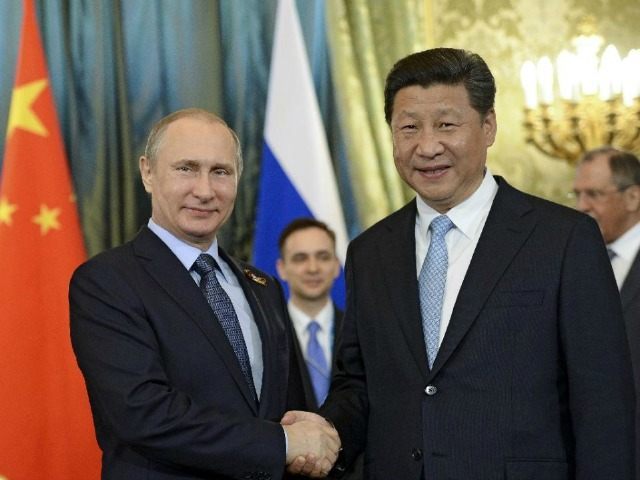It is Victory Day in Europe and Russia, but Russian President Vladimir Putin met with Chinese President Xi Jinping instead of celebrating with his World War II allies. The talks include agreements on the economy and energy as Russia continues to suffer under sanctions for the country’s invasion of Ukraine.
Putin and Xi signed an agreement to invest over $19.7 billion on a high-speed railway to link Moscow and Kazan, which is 503 miles east of the capital. The Russian government insists the railway is needed to create “a high-speed transport corridor between Moscow and Beijing.”
Another deal includes $2 billion for agricultural projects in both countries. The government needs the money “to boost local food production after Moscow banned imports of produce worth around $9 billion per year from the United States, Europe.” The three parties involved are the Russian Direct Investment Fund (RDIF), Russia-China Investment Fund (RCIF), and the People’s Government of Heilongjiang province, which borders Russia. The agreement also allows the three to possibly build “an experimental agricultural free trade zone between Heilongjiang province and Russia’s neighboring Amur Region.”
The two leaders agreed to cooperate on the Eurasian Economic Union (EAEC) and the Silk Road Project. Putin signed the EAEC with the presidents of Belarus and Kazakhstan in May 2014, and it went into effect this January. In exchange, Moscow will help China rebuild the Silk Road, the ancient trading route that connects East to West.
The visit allowed Putin to open Russia’s financial world to China due to the economic sanctions. RDIF, RCIF, and the China Construction bank signed a deal that “will allow Russian companies, struggling to repay foreign debts, to raise up to $25 billion in the next two to three years at lower costs than on the domestic market.” However, RDIF must “provide around $1.5 billion” to the partnership while also co-finance “future deals” and be the “warrantor in case of possible defaults.” It is a risk, but since the sanctions forced Western companies to pull out of deals, RDIF did not have much of a choice.
“We will focus on companies that are not under formal sanctions but are having difficulties attracting money,” explained RDIF chief Kirill Dmitriev. “We plan to help companies that as a result of the current geopolitical situation are experiencing problems attracting liquidity.”
As a token of gratitude, Xi also asked Putin to join him in Beijing to celebrate the 70th anniversary of China’s victory over Japan.
“On Sept. 3, our country is planning to hold celebrations on the occasion of the 70th anniversary of the victory in China’s War of Resistance against Japan and the victory in WWII,” Xi asked Putin before the leaders signed the various agreements. “In this regard, I cordially invite you to take part in these celebrations.”
Putin did not provide an answer, but thanked his guest for celebrating Victory Day in Moscow. Xi is the highest ranking official in Moscow since Putin’s counterparts in the West turned down his invitations. German Chancellor Angela Merkel will be in Moscow over the weekend to meet with Putin and hold a low-key celebration.

COMMENTS
Please let us know if you're having issues with commenting.